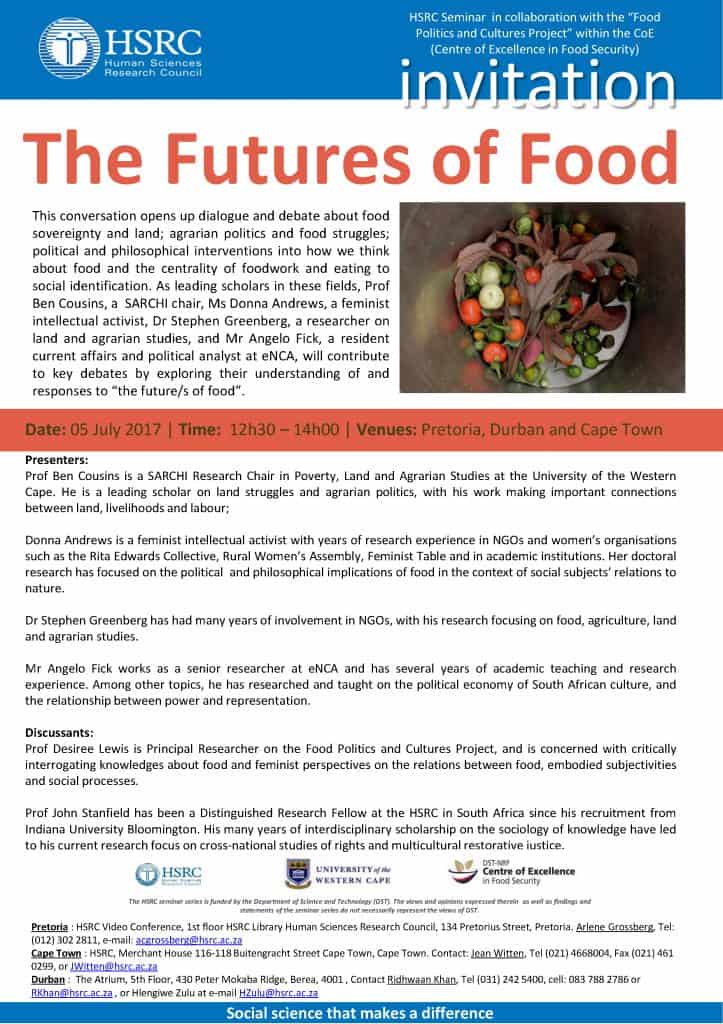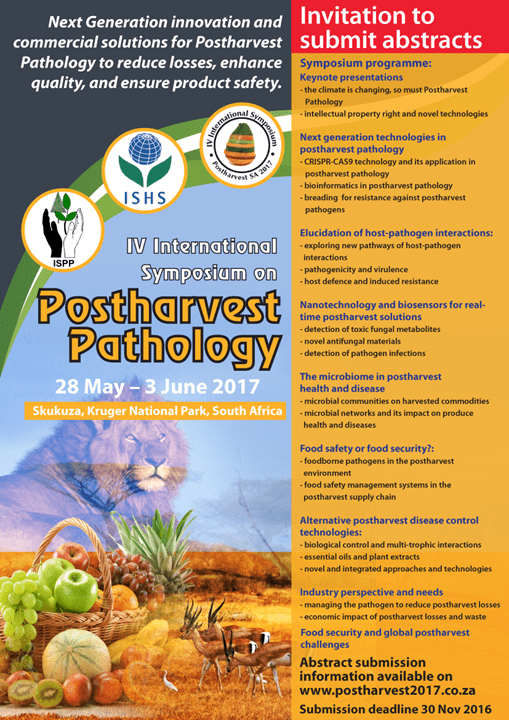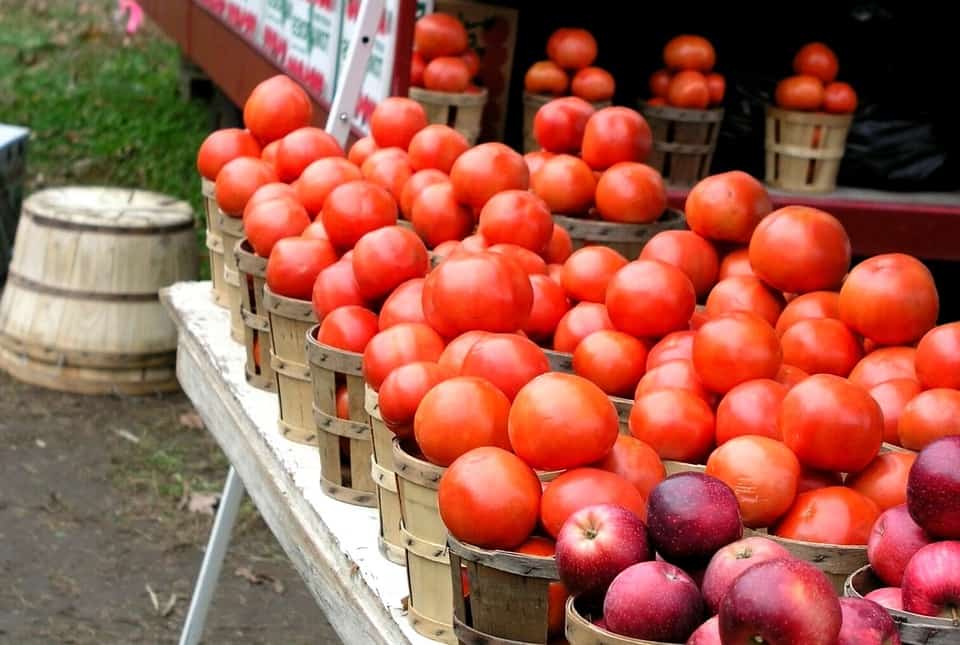Competition, Concentration and Employment in the Food Sector
Joint colloquium by CCRED, the CoE in Food Security and PLAAS
Globally, the food system is characterized by increasing concentration and financialization. This is also true for South Africa where there has been a rapid reduction in the number of farming units since deregulation in the 1980s and increasing concentration at the processing, distribution and retail levels of the agricultural value chain.
There have also been numerous cases of cartel conduct and unilateral abuse of market power in this sector. In some markets; notably fertiliser, seeds, and retail, similar competition concerns are evident across the region and so too, are the firms that perpetrate them. Several researchers across southern Africa are evaluating the effects of concentration, market power and financialisation on workers, firms and farmers in the food sector.
This colloquium brings these researchers together to discuss key areas of their work with the view to identifying common questions and joint research opportunities. The colloquium will also work towards formulating practical policy proposals for food systems across the region.
Venue: CCRED Seminar Room, 1st Floor, 6 Sturdee Avenue, Rosebank, Johannesburg. Click here for map
Date: 23 & 24 August 2017
Start Time: 09:00
When does technology enable food access?
Date: 16 August 2017
Time: 12h30 – 13h30
Joint COE/BANG/PLAAS ‘brown bag’ seminar
Presenter: Dr Prashant Rajan, Assistant Professor, Department of English & Communication Studies, Iowa State University
India accounts for the largest share of the world’s food insecure population despite current annual expenditure equivalent to 2% of GDP (approx. $23 billion) on subsidized food production, distribution, and consumption through its public distribution system (PDS). The PDS has been critiqued for decades as an inefficient value chain riddled with corrupt intermediaries. Biometric authentication of beneficiary identities through the Unique Identification (UID) Number, or, Aadhaar (Foundation) number is the most recent iteration of governmental efforts to empower beneficiaries and increase the efficiency and transparency of food distribution. I examine whether beneficiary empowerment and monitoring and surveillance always go hand-in hand by studying the costs and benefits of using biometric authentication versus simpler technologies such as chip-based magnetic swipe cards. Results reported are from a four-year collaborative project investigating the use of ICTs by intermediaries and beneficiaries participating in the public distribution system of Chhattisgarh, India. Findings suggest that that ICT-interventions empower beneficiaries when they offer households the freedom to choose when, where, and how they wished to exercise their right to food access. Drawing on transaction, survey, and ethnographic data, I report on the factors influencing ICT adoption by intermediaries, and describe the influence of geographic location and socioeconomic status on intermediary technology use and beneficiaries’ utilization of user freedoms. Findings bear implications for national ICT policies in ways that emphasize frugal, flexible, local alternatives to mega e-infrastructures.
Follow seminar live on twitter: @PLAASuwc or @FoodSecurty_ZA #FoodSecurityAndICT #FoodTech
The Future(s) of Food
Date: 5 July 2017
Time: 12h30 – 14h00
A Panel Discussion Co-Hosted by the “Food Politics and Cultures Project” within the CoE in Food Security and the HSRC will generate dialogue and debate about food sovereignty and land; agrarian politics and food struggles; political and philosophical interventions into how we think about food and the centrality of foodwork and eating to social identification. Join us as leading scholars in these fields contribute to key debates by exploring their understanding of and responses to “The Future(s) of Food”.

IV International Symposium on Postharvest Pathology
Registration is open for the Postharvest Pathology Symposium 2017, to be held from 28 May to 2 June 2017.
The symposium will bring together the postharvest pathology researchers from across academic spheres from around the globe to share their scientific research, develop new collaborations and strengthen existing networks.
Please note: The ABSTRACT SUBMISSION deadline has been EXTENDEDto 15 December 2016.

Food Fraud Workshop by SAAFoST / IUFoST
Programme and Speakers
- Dr Pamela Byrne of the Food Safety Authority of Ireland (FSAI)
- Mrs Penny Campbell of the Directorate of Food Control of the Department of Health
- Mr Niel Erasmus of the Directorate of Food Safety and Quality Assurance of the Department of Agriculture, Forestry and Fisheries
- Nicola Brook (Foodpath) – on local food fraud in the news over the last fifteen years
- Anza Bester (Merieux NutriSciences) – on food fraud terminology
- Janusz Luterek (Hahn & Hahn) – on legal aspects of food fraud in SA
- Harris Steinman (FACTS) – a South African lab’s experience with food fraud
- Wouter Conradie (NSF-CMi Africa) – a food fraud risk model
Cost
Late entry fee: R1,100 – see below
Registration and Payment Procedure
Deadline for bookings
Cancellations
Inaugural Conference for Young African Researchers in Agriculture Network (YARA)
Background
The unabated Africa’s population growth in the face of stubborn poverty in Africa has undermined the continent’s capacity to feed its people and this was exacerbated by the rise of food and energy price towards the end of the last decade that push more people in deep poverty and malnutrition particularly in rural areas. The twin challenges of poverty and hunger has stimulated an unprecedented interest among policy actors at both national and international levels in Africa to start looking at the most efficient and cost-effective models that can help Africa to overcome these challenges.
The transformation of the rural economies in Africa does not only require substantial financial investments from the international community but also, and most importantly, robust and rigorous research in this economic sector which harbours the majority of African population, particularly the poor. A study which was jointly conducted by the World Bank and Elsevier to examine the research that was undertaken in Sub-Saharan Africa between 2003 and 2012 across different science disciplines has found some disturbing trends of, among other things, heavy reliance on international collaboration for research which suggests a lack of internal research capacity to produce high quality research output and very little inter- and intra-collaboration between African academics.
The report found, for instance, that about 65 percent of all research in Sub-Saharan Africa in 2012 were produced through international collaborations while inter-collaborations among Sub-Saharan African researchers only amount for a mere 3.9 percent. The intra-regional collaboration among African researchers in the same year stood at 24.7 percent in West and Central Africa, 13.6 percent for East Africa, and only 5.67 percent for Southern Africa. Another disturbing finding that emerged from this study was a trend that shows very little collaboration between African academics and other major partners on the African continent such as corporate, government, and civil society organizations; which implies that these partners are less likely to rely on African-generated knowledge and research in their work and policy formulation processes on the continent. The main objective of Young African Researchers in Agriculture Network (YARA) is to reverse these trends.
Launched in 2014 at the African Union Head Quarters in Addis Ababa, the network brings together young and early career African researchers in agriculture in order to cultivate the culture of supporting one another, sharing information, networking and collaborating for research projects, all of which contribute towards enhancing research capacity in agriculture on the African continent. YARA ethos is built on the need to support and promote young scholars on the continent in order to secure the future of research, policy and practice in Africa’s agriculture. The network is based on the need to claim our space as young and early career African researchers in the African scholarship on agriculture and natural resources management and promote African voices in different academic and policy forums through producing high quality end-user oriented research output.
More information available here: http://www.plaas.org.za/event/inaugural-conference-young-african-researchers-agriculture-network-yara
National Symposium: Food Choice and Obesity in South Africa
Date: 19 January 2017
Time: 08h30 – 16h30
The worldwide increase of obesity has been described as a global health epidemic that poses a serious threat to the health and well-being of populations (Kengne, et al., 2012; Wang and Beydoun, 2007). Low and middle income countries (LMICs) are not spared from the obesity pandemic and are continuing to reflect a rapid increase in body fat levels. Moreover, it is becoming increasingly apparent that many of the LMICs face the double burden of malnourishment and obesity occuring simultaneously amongst certain sectors of the population (Popkin & Slining, 2013; WHO, 2016).
The National Symposium on Food Choice and Obesity in South Africa aims to bring together leading academic scientists, scholars, researchers, postgraduate students, government departments and other participants to exchange and share their experiences and research results on all aspects of obesity. The Symposium is also expected to provide an interdisciplinary platform for participants to critically discuss the current situation and challenges related to Food Choices and Obesity in light of the project outputs.
The Symposium will be divided into substantive sessions providing participants the opportunity to focus on specific areas from their own perspective and national experiences. The main conclusions of the Symposium will be reflected and incorporated into a Policy Document and Policy Brief.
The aims of this event are to:
- To present and discuss the key research findings of the project (e.g. kinds of food consumed, factors determining consumption; self-perceived health status and actual BMI measurements, etc.);
- To understand and compare key results on similar research projects in South Africa;
- To identify important research gaps for future funding by the CoE and other agencies;
- To discuss the outline and content of the proposed policy document/brief and key points to include, and
- To facilitate evidence-based policy making for effective multi-level intervention approaches in health promotion practice across the South Africa.
The symposium is jointly hosted by the Institute for Social Development, University of the Western Cape & the DST-NRF Center of Excellence in Food Security.
Finding Food in the post-2015 Development Agenda
DATE: 9 November 2016
TIME: 13h00 – 14h00
Food is fundamental not only to well-being, but to our social and economic lives. Despite this, one of the biggest challenges facing many people in cities all over the world today is hunger. As cities rapidly urbanise, different pressures are placed on the food system which has resulted in the least nutritious food being the most affordable. The final seminar of this series is entitled ‘Finding Food in the post-2015 Development Agenda’ and will be presented by Dr Jane Battersby. 
Food has not historically been considered central to the urban agenda. However, good nutrition is essential for equitable growth and sustainable urban food systems are key to responding to many of the challenges posed to growing cities. In the wake of Habitat III, this seminar examines the gaps and opportunities to engage the food system as part of urban governance and planning that have emerged in the space generated by the SDGs and New Urban Agenda document. It draws on findings from AFSUN (African Food Security Urban Network) and the Consuming Urban Poverty project.
Speaker bio
Jane Battersby is an urban geographer with an interest in all things food related. Her current areas of particular interest are urban food systems, urban food policies and the construction of food security theory in Northern and Southern research contexts. This work has both theoretical and applied components. Underpinning her food work is an ongoing interest in the linkages between spatial transformation and identity transformation in post-apartheid urban areas – a topic she has addressed through the lenses of youth identities, education, music and land restitution. Jane has been the Cape Town Partner of the African Food Security Urban Network (AFSUN) since 2008, and is currently the Research Co-ordinator of the ACC’s Consuming Urban Poverty Project, and is associated with the Hungry Cities Programme.
How food and nutrition security is understood and measured: CLEAR-AA Seminar
The Centre for Learning on Evaluation and Results Anglophone Africa (CLEAR-AA), South Africa, Johannesburg and Wageningen UR Centre for Development Innovation (CDI), Netherlands. CLEAR AA and Wageningen CDI are hosting a two weeks refresher course titled “The use of up-to-date indicators in monitoring, evaluation ad impact assessment of food and nutrition security programmes” taking place at the Wits School of Governance (WSG), South Africa-Johannesburg on the October 31st to November 11th 2016. The seminar on “how food and nutrition security is understood and measured” forms part of this course.
Date: 4 November 2016
Time: 09h00 – 12h30
Panelists:
Dr. Caryn Abrahams: Senior Lecturer – Wits School of Governance
Abrahams, a senior lecturer, holds a PhD in Social and Political Science from the University of Edinburgh, in the Centre for African Studies. She completed her Masters, Honours and undergrad degrees at the University of the Witwatersrand, with specialisation in Human and Urban Geography. Before joining the WSG, Caryn was a senior researcher at the Gauteng City-Region Observatory – a partnership of Wits University, University of Johannesburg and Gauteng Province – where she focused on social cohesion, anti-racism, urban inclusion, and urban food systems in Gauteng Province. Abrahams’ research is anti-disciplinary as it draws on a range of scholarship broadly in the social sciences – urban studies, development, economic geography, sociology, politics – but is not confined to a particular discipline. Her research interests and curiosities include anti-racism, urban inclusion, urbanity, urban food systems and urban society
Dr. Naude Malan: Senior Lecturer – University of Johannesburg
Dr. Naudé Malan is Senior Lecturer in Development Studies at the University of Johannesburg. He is the co-leader of the multi-stakeholder engagement project Izindaba Zokudla that is part of Michigan State University’s Global Innoversity. This project aims to create opportunities for urban agriculture in a sustainable food system in Soweto. The project engages with and links urban farmers, entrepreneurs, academics, civil servants and other stakeholders and aims at participatory technology and enterprise development. Dr Malan has published on the South African social welfare system, agriculture and human rights and recently has developed an interest in social methodologies for technology design for urban and small-farmers. Dr. Malan completed his M.A. in Development Studies at the RAU in 1997 which dealt with participation in Agricultural Development at the Tshikonelo Agricultural Project in the Limpopo Province. His D. Phil was done under Marius Olivier and investigated the role of Civil Society in the realization of the right to have access to social security in South Africa. He was a Visiting Research Fellow at the Centre for African Studies at Cambridge University. He has taught in the Faculties of Humanities, Art, Design and Architecture, Law and Engineering at the University of Johannesburg.
Mr. Daniel McLaren: Senior Researcher -The Studies in Poverty and Inequality Institute (SPII)
Daniel McLaren is a Senior Researcher and Project Manager of the Socio-Economic Rights Monitoring Tool project at SPII. He is the holder of an MPhil in Human Rights Law from the University of Cape Town and has co-authored reports for SPII on the realisation of the rights to housing, food and basic education since the Constitution came into force in South Africa.
Moderator:
Dr. Marlene Roefs: Senior Monitoring and Evaluation Advisor – Wageningen University
Marlene is a Monitoring and Evaluation specialist. She has research and consultancy experience in poverty, food security, economic and sustainable development, governance, basic services, and renewable energy. Main areas of expertise include survey research, M&E systems and frameworks, strategic planning, logic models (ToC), and evaluations.
Please RSVP by the 24th October 2016 to Mokgophana Ramasobana on: mokgophana.ramasobana@wits.ac.za or Tel: +27 11 717 3456 and Mobile: +27 72 936 5645
Food insecurity, the consumer food environment, formality and informality in SA’s food system: A World Food Day Panel Discussion
This full day panel discussion is aimed at showcasing work in progress by researchers affiliated to the Centre of Excellence in Food Security (CoE-FS) , PLAAS and collaborating partners, as well as creating space for individuals and organisations to discuss challenges around ensuring access to nutritious, affordable food for all in South Africa.
This full day event will consist of three panel discussions focusing on:
- Food insecurity in South Africa;
- The consumer food environment, corporate power and food and nutrition security in South Africa; and
- Livelihoods, formality and informality in the food system.
The event is in observance of the Food and Agriculture Organisation’s World Food Day commemoration that takes place annually on 16 October. It is a collaboration between the CoE-FS, the Institute of Poverty, Land and Agrarian Studies (PLAAS) at the University of the Western Cape, African Centre for Cities (ACC) and the Labour and Enterprise Policy Research Group (LEP), both at the University of Cape Town.
RSVP by email to: jvandieman@plaas.org.za by 14 October 2016
Provisional programme available here
Live tweets can be followed from: #WFD2016 and #SAfoodsystem